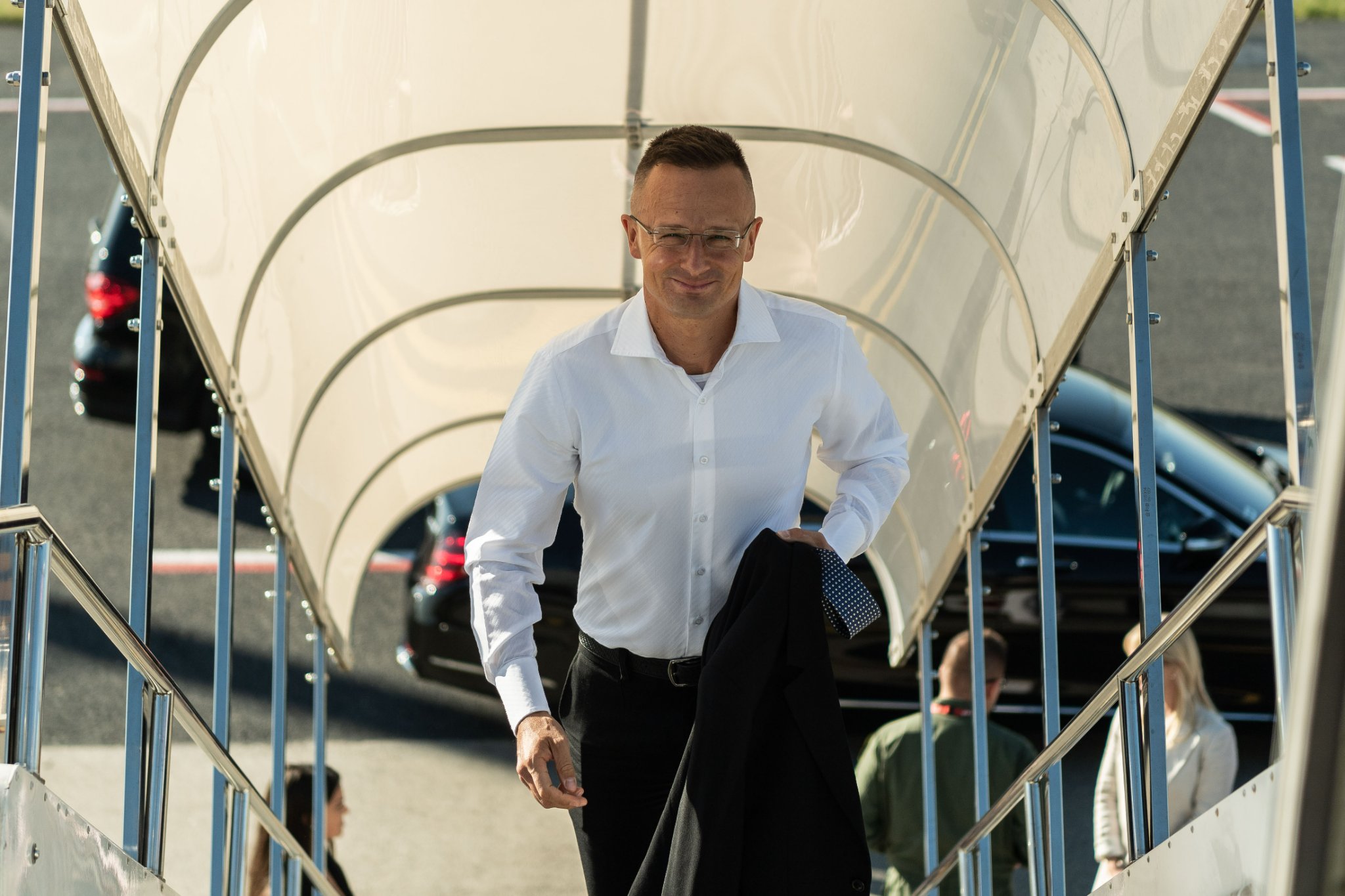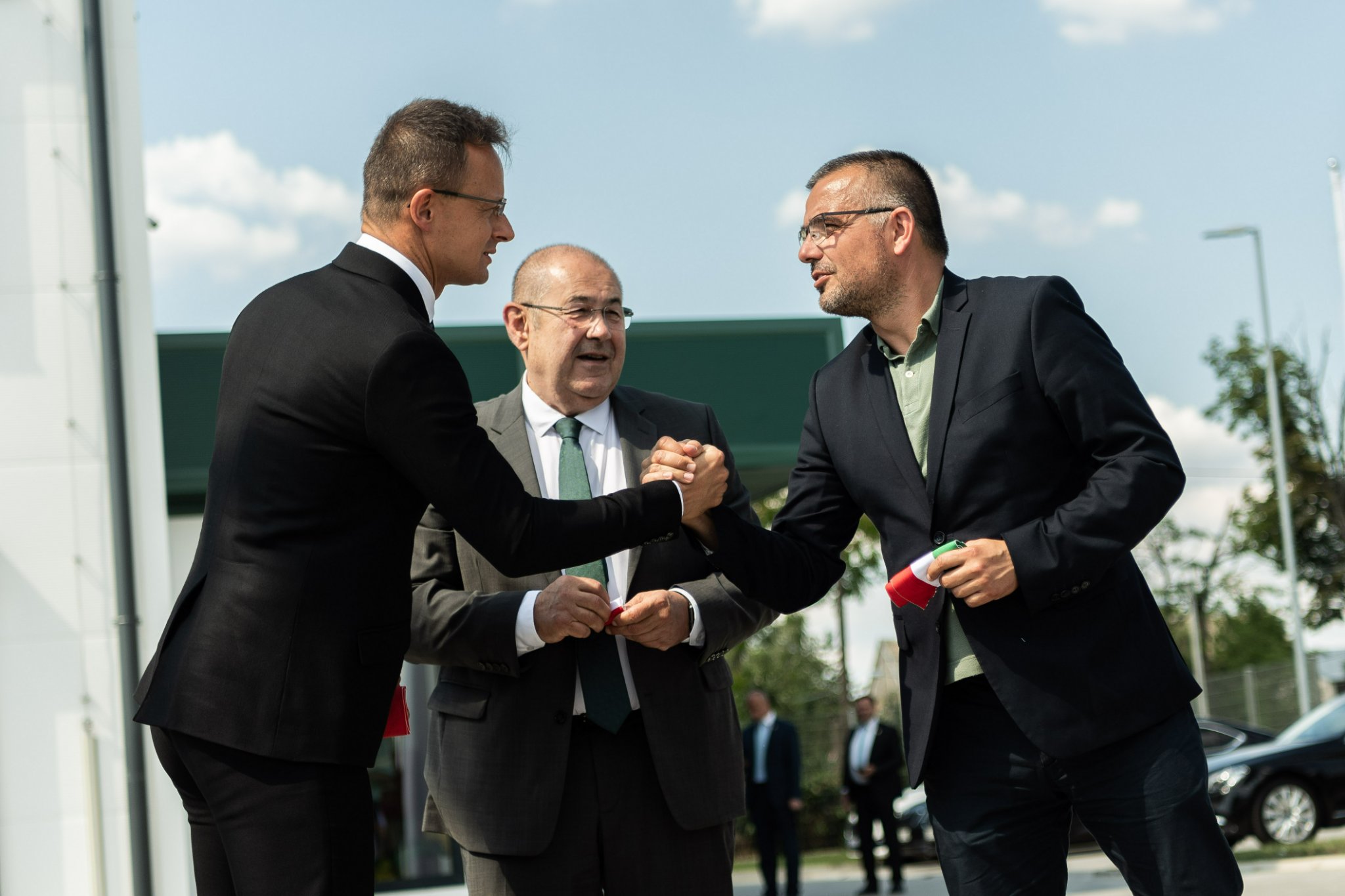
Performance of national team is key element of national pride, Hungary's foreign minister says – video
After a resounding victory, the Hungarian national football team leads its group in the UEFA Nations League. The performance of the national team is an important element of national pride, Hungary's foreign affairs and trade minister told Subotica-based Pannon TV in an interview before the England-Hungary match. In the interview, Peter Szijjarto also spoke about the possibility of Budapest holding the Olympic Games and the economic consequences of the Ukraine-Russia war.
Hungarian sports investments yield results
Gaining 7 points in 4 rounds, the Hungarian national squad is in the top position of its group in the UEFA Nations League. Team Hungary chalked up a stunning 4-0 victory over England in an amazing match in Wolverhampton on Tuesday night. In an interview before the match, the Hungarian foreign affairs and trade minister said the country was proud of the performance achieved by the national side. Among the Hungarian sports development projects, investments in football are apparently also starting to pay off, Peter Szijjarto said.
There are times when the ideaarises that we should have been braver and built a larger stadium, because it looks quite certain that well over the current 67 thousand seats would have been sold for the matches of the European Championship and of the national team, the minister said, speaking in the programme Szubjektiv on Pannon TV. He added that he is proud that ever since the Puskas stadium was opened, the national team has nearly always played before a full house.
„Anyone who had doubts as to whether Hungarians love football or not can now see that football has immense power to strengthen identity. The performance of the national team is an important element of national pride,”
the minister said.
Peter Szijjarto added that recently, Hungarian football has made significant progress compared to previous years, and they do everything they can to provide Hungarian children with facilities to do sports and achieve results, not only in football, but also in other sports. This is the goal of the investment projects the Hungarian government is implementing, the minister added.

Photo: MTI
Booing in England
„They lied about our children booing, and then they jeered during our national anthem… In the end, though, we sang our anthem in Wolverhampton after the match. Now everyone knows that there’s no point in provoking us,”
the foreign affairs minister remarked, writing about the experience of the England-Hungary match on Tuesday night.
It was the second time that the Hungarian team defeated England in the Nations League. In the first clash, the team won before an audience of tens of thousands of children. Following the match, some claimed that the Hungarian children booed when the English team took the knee, with some even accusing them of racism. The adjectives „tragic” and „ridiculous” cross his mind whenever he hears this, and it is hard to decide which is the more appropriate word to use, Peter Szijjarto commented.
„35 thousand Hungarian children watched the Hungarian national team play. No one should think that Hungarian children are racist, that they would boo players taking the knee. This is nonsense. At a match like this, where there are 35 thousand children, there is obviously no organised support, but there is a kind of buzz. The kids are not in class or in the theatre, no one can expect them to sit silently, but it’s obviously far-fetched to say that they booed the English team,”
Peter Szijjarto underlined.
It was time to overcome such frustrations, the minister remarked in conclusion on the topic.
Budapest bidding anew for the Olympics?
In recent days, information has began to circulate that Hungary will again apply for hosting the Olympics. In response to this information, Peter Szijjarto noted that this sporting event would put a country into the global focus of interest for weeks and months, and that if it is not a „Covid Olympics”, then it will attract hundreds of thousands of visitors to the country. It is very difficult to monetise the advertising value of a given sporting event for a country.
„Unfortunately, those who rejected the opportunity to host the Olympics in Budapest deprived the Hungarian nation of a big dream. Right now, there is no such decision on the table, but one thing is certain. Our organisational experience, the results of organising major world competitions, and the standard of our sports infrastructure would allow Hungary to host even the Olympic Games with practically very little extra investment,”
Peter Szijjarto said.
In 2015, the Hungarian Olympic Committee decided to submit a bid for hosting the 2024 Olympic and Paralympic Games in Budapest. In July of that year, the Hungarian parliament also supported this decision. A large majority voted in favour, with only leftist MPs against. Then in 2017, the Momentum Movement started campaigning for signatures to prevent the Olympics from taking place in Budapest. They wanted to call a referendum in the Hungarian capital, asking „Do you agree that the Municipality of Budapest should withdraw its bid to host the 2024 Summer Olympic and Paralympic Games? The Momentum Movement submitted 266 151 signatures in support of the withdrawal.
Later, Prime Minister Viktor Orban, Zsolt Borkai, chairman of the Hungarian Olympic Committee (MOB) and Istvan Tarlos, mayor of Budapest, decided that Budapest would withdraw its bid. To this end, the government passed a resolution calling on the Municipal Assembly of Budapest and the chairman of the Hungarian Olympic Committee to withdraw the bid to host the Olympics. In the decision, the dissolution of the previously established unity was cited.
The war between Russia and Ukraine begs the question: Will there be enough food in most of the world?
In an interview with Pannon Television, Peter Szijjarto spoke about the Russia-Ukraine war and its impact on the world. He said, we are talking about two of the world’s biggest food exporters. The conflict has left tens of millions of tonnes of grain pent-up in Russian and Ukrainian silos.

Photo: Pixabay
They will be missing from the food supply in many parts of the world. Some experts estimate that up to 25 per cent of the world’s population will starve in the next period. Hungary, however, has enough food, as it produces double the amount of food it consumes. This means that Budapest can help other countries, including its neighbours, with food products and agricultural machinery to ensure their own supplies.
„The cooperation between Serbia and Hungary will help to further modernise Serbian agriculture to make it even more advanced and results-oriented. If this is achieved, the export capacities of Serbia’s agriculture will also increase. By modernising the agriculture sectors in the two countries, we can contribute to alleviating the difficulties and challenges of a potential food crises in some areas areas of the world with our products,”
Mr Szijjarto said.
The Hungarian FM stressed that the most important thing is to achieve peace as soon as possible. He said that when there is a war next door, it poses a serious security risk to all neighbouring countries. Meanwhile, the war is also affecting energy supplies and the economy, he added. Szijjarto recalled that Hungary is doing everything possible to achieve peace and hopes that the negotiations will be revived. As the minister said, we are all paying the price of the war.
„We want to avoid a situation in which the price of the war will be paid by the Hungarian people. We Hungarians had nothing to do with this war, we Hungarians did not want this war. We are in no way responsible for this war. Obviously, we do not accept to pay the price of the war. That’s why it’s very important that while prices are rising all over the world because of war and sanctions, in basic areas like energy or food, we are protecting Hungarians from this,”
the minister said.
„This is why there are price caps and price freezes in Hungary,” Mr Szijjarto pointed out, adding that this is why the government maintains price caps on fuel and staple food products, and why the utility bill cuts scheme is also being protected.
While the world focuses on the economic consequences, more than 10,000 Ukrainian refugees are arriving at Hungary’s borders every day. According to the FM, their number will not decrease in the coming period. Mr Szijjarto said that with fighting intensifying and the possibility of peace in the short to medium term fading away, more people than ever before are expected to leave for Hungary. That is why Hungary is currently providing the largest humanitarian aid in its history, with more than 2,000 tonnes of aid also delivered to Ukraine so far.
Új útvonalak a Kelet és Nyugat közötti áruszállításban
New routes for cargo transport between East and West
The European economy cannot function without supplies from the East, so transport from the South to the North is becoming more valuable as the routes between East and West are experiencing difficulties in operation because of the war. In this new situation, the reconstruction of the Belgrade-Budapest railway is becoming increasingly important. As soon as the works are completed, it will be the fastest and most modern rail corridor connecting the western half of Europe with the ports of South-Eastern Europe, the Hungarian FM said in the interview. The project will be completed by 2025, Mr Szijjarto underlined.

Photo: Facebook

